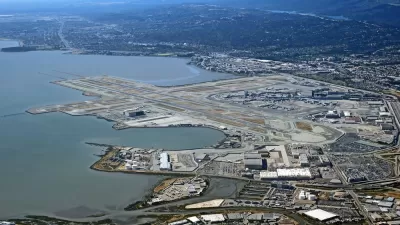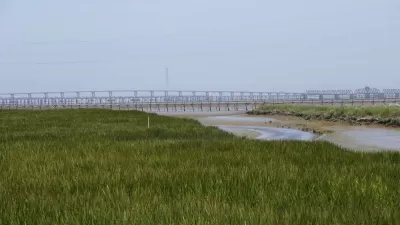The San Francisco Bay is usually an undesirable place to swim, except for a hearty few. A development proposal seeking assistance at the state level would add a pool to the Bay’s waters to make the idea of going for a swim more appealing.

A bill under consideration by the California State Legislature would authorize construction of a heated, Olympic-sized pool in the San Francisco Bay.
In an article for the Mercury News, Marissa Kendall reports that the bill is necessary because the state owns the proposed site of the pool—Piers 30-32.
The project would replace two connected, dilapidated piers currently used as parking. One pier would be rebuilt and converted into 375,000 square feet of offices and 45,000 square feet of retail space. The other would become the pool, which would float on a barge, and would include space for lap swimming, water polo games and lounging in a hot tub. A section of the Bay surrounding the pool would be dedicated to open water swimming, kayaking and paddle boarding.
Trammell Crow Company, the project developer, is also proposing a 725-unit apartment tower across the street.
State Senator Scott Wiener, (D-San Francisco) authored the bill, Senate Bill 273. Sen. Wiener is more familiar to Planetizen readers as one of the primary driving forces of the pro-development political agenda that has gained traction in the state in recent years.
“Past attempts to revitalize the piers have fizzled — including ideas to turn them into an arena for the Golden State Warriors, a George Lucas museum and a cruise terminal,” notes Kendall. Wiener belies the current proposal will succeed because of its intentions to preserve the piers, which previous development proposals did not include.
FULL STORY: Plans to build a massive, floating pool on the San Francisco Bay get legislative boost

Maui's Vacation Rental Debate Turns Ugly
Verbal attacks, misinformation campaigns and fistfights plague a high-stakes debate to convert thousands of vacation rentals into long-term housing.

Planetizen Federal Action Tracker
A weekly monitor of how Trump’s orders and actions are impacting planners and planning in America.

In Urban Planning, AI Prompting Could be the New Design Thinking
Creativity has long been key to great urban design. What if we see AI as our new creative partner?

Pedestrian Deaths Drop, Remain Twice as High as in 2009
Fatalities declined by 4 percent in 2024, but the U.S. is still nowhere close to ‘Vision Zero.’

King County Supportive Housing Program Offers Hope for Unhoused Residents
The county is taking a ‘Housing First’ approach that prioritizes getting people into housing, then offering wraparound supportive services.

Researchers Use AI to Get Clearer Picture of US Housing
Analysts are using artificial intelligence to supercharge their research by allowing them to comb through data faster. Though these AI tools can be error prone, they save time and housing researchers are optimistic about the future.
Urban Design for Planners 1: Software Tools
This six-course series explores essential urban design concepts using open source software and equips planners with the tools they need to participate fully in the urban design process.
Planning for Universal Design
Learn the tools for implementing Universal Design in planning regulations.
planning NEXT
Appalachian Highlands Housing Partners
Mpact (founded as Rail~Volution)
City of Camden Redevelopment Agency
City of Astoria
City of Portland
City of Laramie





























